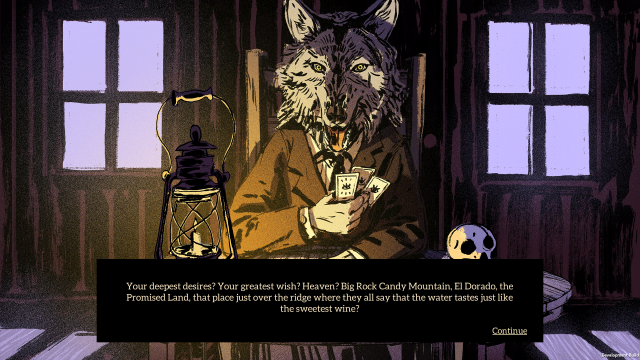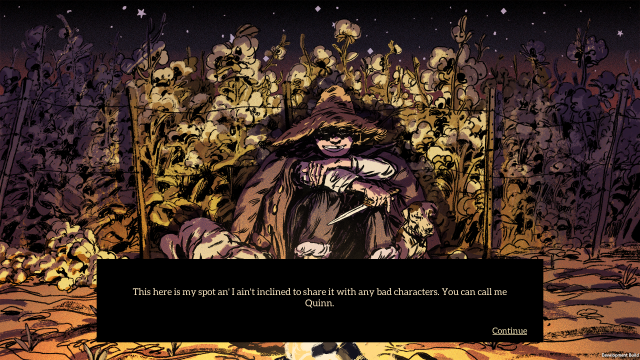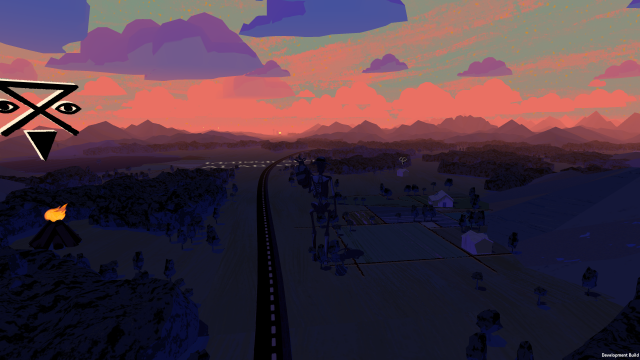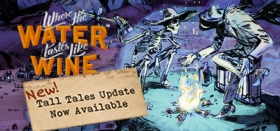Where the Water Tastes Like Wine Review
Where the Water Tastes Like Wine offers up something unique compared to most games. A narrative-driven walking simulator, that relies on the smaller stories of myth and legend, to discover the bigger picture. These bizarre and outlandish stories will have you gripped, wanting for more. If you can put up with the endless wandering.
You’re tasked with collecting tales from across a Depression-era America. After losing a game of cards to a wolf – and of course being unable to pay your debt – the wolf asks you to collect folk stories as payment.

You guide a skeleton avatar around the map, navigating different states by foot, hitchhiking or by train, encountering and collecting micro-stories as you go. These stories, which are indicated by an icon bobbing up and down, usually come from an interaction with either an animal or person in the world. And these folktales range from the mundane to the outright bizarre, the tragic to the heroic. One interaction that ended up becoming one of my favourite stories was that of a talking crow, which beckoned me to come closer as it had something to tell me, only to try and peck my eyes out and berate me for being so trusting. Each story is accompanied by a wonderfully illustrated vignette and some fantastic narration. Keythe Farley, who voices the main narrator in the game, brings some character and excitement to each tale with his gruff yet soothing tones.
The beefier stories can be found when stopping at a campfire and resting for the night. Here you will encounter other weary travellers with their own stories to tell. A hippy, coal miner, and a war veteran are just some of the people you’ll meet out on the road. As you warm by the fire, these drifters will ask you to tell them a tale from one of five categories (exciting, hopeful, funny, tragic, scary) that can be recalled from your encounters out in the world. They will then reveal something about themselves, relating to that stories theme.
Finding the right stories these characters want to hear is a bit of a mixed bag. Sometimes it’s obvious, sometimes not, but tell them a story they want to listen to, and they will begin to trust you more, and their “eye” will open. Fully open it, and the character will reveal more about their backstory and have new responses for when you meet them at another campsite further along the road. It’s these stories that are the primary objective of the game. The stories about real people and their lives.

One feature that is sorely missing from Where the Water Tastes Like Wine is a menu system where you can find all the stories you’ve collected and listen to them again. Once you’ve found and listened to a story, it disappears, never to be heard again, which I think is a shame. Plus, it would make it easier when trying to appease a character with the choice of story they want, as you could refresh your memory of all the stories you have found.
It’s the travelling from state to state that is Where the Water Tastes Like Wine’s biggest downfall. Walking is far too slow. Hitchhiking rarely works, and when it does, you’ll often travel too far or too little. Catching a train is easy enough, but is limiting in what other stations you can go to. To get around, I often found myself plodding from city to city, and it soon became mind-numbing. The problem is the map isn’t appealing. It’s a washed out mix of pastel pink and blues that make the landscape dull and sleepy. You can speed up the walking pace by playing a small mini-game that uses the arrow keys to whistle out a tune. This whistling soon becomes repetitive. It also plays over the top of a fantastic soundtrack.
One of the main reasons for playing Where the Water Tastes like Wine—aside from the wonderful well-written—is the soundtrack, which is an eclectic mix of American folk genres. From bluegrass to jazz, from country to the blues. It is a delight to wander from state to state, listening to different songs as you cross state lines. However, over time the songs do grow stale. I spent around ten hours playing Where The Water Tastes Like Wine, and although there are thirty different songs, they soon blur all into one.

One other small gripe I had with this game was Sting. That's right, Sting from The Police. He voices the wolf at the beginning of the game, and for me, was not at all convincing. Sting gives a lacklustre performance which is a shame as all the other characters are voiced well. Sting, stick to the music mate.
Overall, Where the Water Tastes Like Wine is a good game, if you prefer heavy, narrative-driven games. The short stories are gripping. More often than not, you will be itching to find out what happens next in a story. Although, it does involve a lot of reading. The main storyline isn’t all that convincing, and won't drive you forward. I stopped caring about the characters at the campfires with the more complex stories in the end. I just wanted to stop trudging across the map. The real joy in Where the Water Tastes Like Wine is in those fantastic short stories if you’ve got the patience to listen and read them.
Where the Water Tastes Like Wine (Reviewed on Windows)
Game is enjoyable, outweighing the issues there may be.
A story packed adventure which spans across the USA, with some wonderfully written stories, a fantastic soundtrack, and some sublime voice acting. However, Where the Water Tastes Like Wine is let down by a map that is too large often resulting in a lot of time spent walking, doing nothing.







COMMENTS